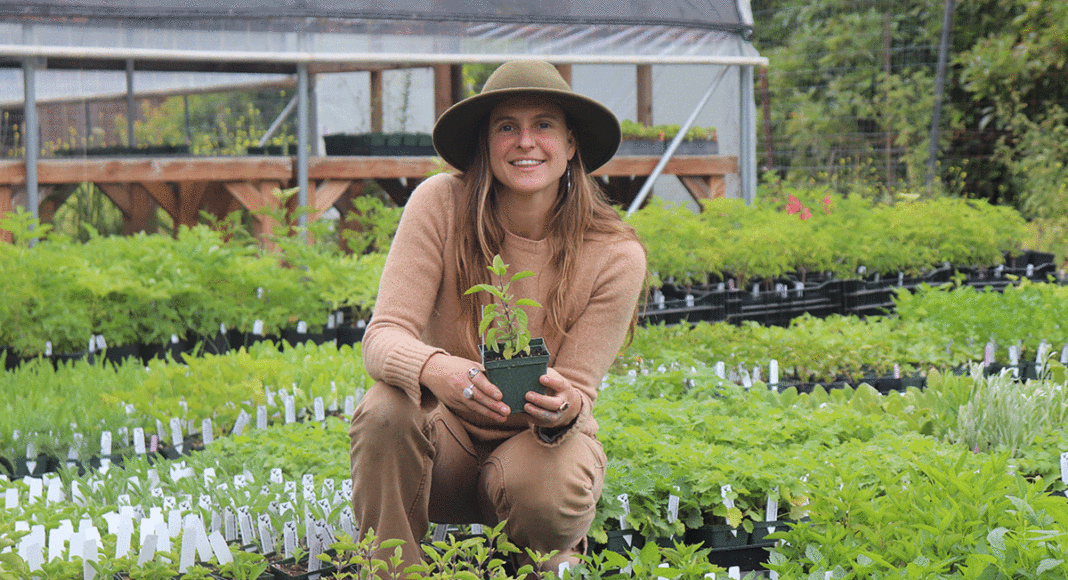In my end-of-summer attempts to enjoy the afternoons, I’m getting sunburned more than I should. I often find myself picking away at the long fingers of my aloe plant, rubbing the stringy goop on my shoulders and nose to ease any lingering sting.
Healing at the expense of plants is something humans have done for centuries. While I appreciate modern medicine, my aloe plant reminds me that healing relief for minor problems—even if fleeting—may be just a pluck away.
Cameron Salomon, grower and owner of Kindred Herbs medicinal plant nursery, began cultivating her company’s healing plants around a year ago. Since then, she’s grown more than 60 types of medicinal herbs on her little plot off Ocean Street Extension.
“I’ve been focused on herbs for the last six years, and it’s been a longtime dream of mine to open a nursery, since I was a teenager,” says Salomon, who is currently gearing up for a fall varietals sale.
She buys seeds from Oregon organic farm Strictly Medicinals, which focuses on potent plants with varied health benefits. “There is an emphasis on the medicinal contents of plants, rather than their beauty or shelf life, which is kind of what our food crops and flowers have turned into,” says Salomon, who also prioritizes ecological benefits like healthy soil. “Some of them are beautiful, but that’s not their only purpose.”
The roots of the project hew close to Saloman’s own interests. “It’s called Kindred Herbs, but it also could be, like, ‘Cameron’s favorite plants,’” she laughs. For others with an interest in gardening, from beginners to connoisseurs, here are a few plants she’d recommend:
Lemon Balm
“Lemon Balm is a digestion herb. It’s good for kids, pregnant women and the elderly. It’s a safe herb. It benefits digestion, but it’s also a very uplifting. It even has antiviral properties. It’s a powerful herb for being so safe, and is easy to grow. It’s a mint relative.
Some of the important things to think about are ‘right plant, right place.’ There are little tags on the plants to tell you where to put herbs and what they need. If they are in the right place, they will really grow themselves.”
Calendula
“Calendula is another plant that grows itself. It makes a beautiful, bright orange flower. It’s drought tolerant, which is important to our climate, and it flowers throughout the season. It has a very broad window for harvesting. You’ll plant it in one spot and see it pop up in other parts of your garden. It grows well with fruit trees, too.
It helps repair the skin and cellular tissue. It’s one of the main ingredients in all-natural salves you see. It’s pretty easy. You can make an infused oil, and it also has an edible flower that you can put in salads or on cakes. It’s a common ingredient in cold and flu tea recipes. It’s bitter, so I wouldn’t do an all-calendula tea, but a little bit can be helpful. It’s also a lymphatic herb, which is one of the cleaning systems of the body.”
Passionflower
“There is edible passion fruit, which is passiflora edulis, but this is passiflora incarnata. They are related, but this is the medicinal plant version. It’s a perennial vine. You can harvest the flowers of the leaves. It makes a purple flower that is quite stunning and looks like it’s from another planet. It’s an amazing nervine. It calms down the nervous system and helps promote relaxation. It’s a good sedative, and will help the body go to sleep, but it won’t leave you groggy the next day.”
Elderberry
“Every home should have an elderberry. It flowers in the summer and sets berries in the late summer to fall. It’s one of the top antiviral herbs. It’s one of those herbs that is like a food. You can consume it as if it was a food. It’s safe to take regularly. Depending on the amount you take—usually it’s a teaspoon for a kid or tablespoon for an adult—taking it throughout the winter is a really effective way of staving off colds and flu.
You can make a syrup out of it. You harvest the berries and boil them and add honey. It’ll last for a couple of months that way. You can also use the flowers. They can be made into a cordial. You infuse the flowers with water and add a sweetener. It will naturally ferment, there is a cordial and liqueur. It’s a fun way to enjoy medicine.”
Kindred Herbs will host its second medicinal herb sale from 10am-3pm on Oct. 12-13 at 2014 Ocean St. Extension, Santa Cruz. kindred-herbs.com.














